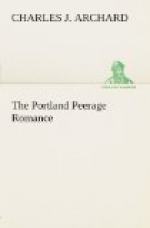“‘It is the blue ribbon of the turf,’ he slowly repeated to himself, and sitting down at the table he buried himself in a folio of statistics.”
In a personal allusion to the arduous political labours of Lord George Bentinck, Disraeli says: “What was not his least remarkable trait, is that although he only breakfasted on dry toast, he took no sustenance all this time, dining at White’s at half-past two o’clock in the morning. After his severe attack of influenza he broke through this habit a little during the last few months of his life, moved by the advice of his physician and the instance of his friends. The writer of these observations prevailed upon him a little the last year to fall into the easy habit of dining at Bellamy’s, which saves much time and permits the transaction of business in conversation with a congenial friend. But he grudged it; he always thought that something would be said or done in his absence, which would not have occurred had he been there; some motion whisked through or some return altered. His principle was that a member should never be absent from his seat.”
Disraeli thus describes the last farewell he took of Lord George and his tragic death a few days afterwards:
“He goes to his native county and his father’s proud domain, to breathe the air of his boyhood and move amid the parks and meads of his youth. Every breeze will bear health, and the sight of every hallowed haunt will stimulate his pulse. He is scarcely older than Julius Caesar when he commenced his public career, he looks as high and brave, and he springs from a long-lived race.
“He stood upon the perron of Harcourt House, the last of the great hotels of an age of stately manners, with its wings and courtyard, and carriage portal, and huge outward walls. He put forth his hand to bid farewell, and his last words are characteristic of the man, of his warm feelings, and of his ruling passion: ’God bless you; we must work, and the country will come round us.’”
A few days after this interview Lord George returned to Welbeck.
“Some there were who thought him worn by the exertion of the session, and that an unusual pallor had settled upon that mantling and animated countenance. He himself never felt in better health or was ever in higher spirits, and greatly enjoyed the change of life, and that change in a scene so dear to him.
“On the 21st of September, 1848, after breakfasting with his family, he retired to his dressing-room, where he employed himself with some papers and then wrote three letters, one to Lord Enfield, another to the Duke of Richmond, and the third to the writer of these pages. That letter is now at hand; it is of considerable length, consisting of seven sheets of notepaper, full of interesting details of men and things, and written not only in a cheerful but even in a merry mood. Then, when his letters were sealed, about four o’clock he took his staff




